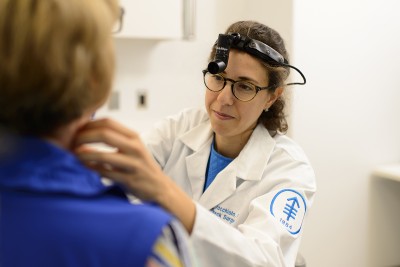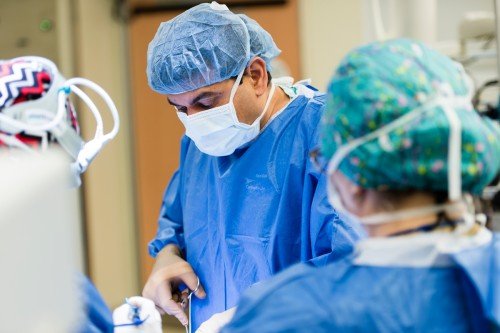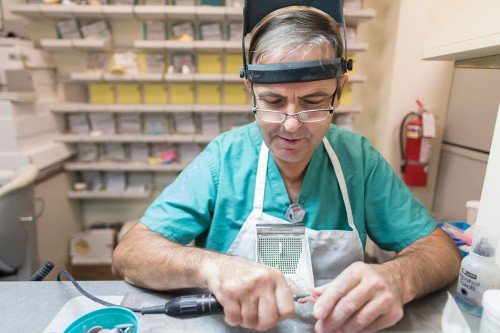
Surgery is the main treatment for most people with mouth cancer. Usually these tumors can be removed through the opening of the oral cavity, but some may require a more extensive approach. Which surgery is right for you depends on such factors as the size, stage, and location of your tumor.
Memorial Sloan Kettering is a leading center for mouth cancer surgery. Our head and neck surgeons are nationally and internationally recognized for their expertise. They work closely with an entire team of head and neck experts to create a precise treatment plan tailored to each person’s individual needs.
MSK’s head and neck surgeons place a strong emphasis on removing the cancer completely while preserving your quality of life. Achieving this delicate balance is our goal. It allows us to provide you with the best option for control of the disease while being highly attentive to your ability to speak, eat, and swallow.
Here you can find an in-depth overview about the different types of surgeries used to treat mouth cancer, as well as information on MSK’s expertise.
- Glossectomy
- Mandibulectomy
- Maxillectomy
- Lymph Node Removal during Mouth Cancer Surgery
- Reconstructive Surgery for Mouth Cancer
- Dental Implants
- Mouth Cancer Surgery Recovery
- Why Choose Memorial Sloan Kettering’s Head and Neck Surgeons for Your Mouth Cancer Care
Glossectomy
Glossectomy is the name of the surgery used to remove tongue cancers. For smaller cancers, only part of the tongue may need to be removed (partial glossectomy). For larger cancers, a more substantial portion of the tongue may need to be taken out.
Reconstruction of the tongue is often part of the care plan. MSK’s plastic surgeons preserve and reconstruct the remaining portion of the tongue using innovative techniques to achieve the best function possible.
For example, they frequently perform a procedure called a radical forearm flap, taking skin from the forearm and the soft tissues underneath to rebuild the tongue. Using microsurgical techniques, they connect the tiny blood vessels and nerves from the forearm tissue to those in the neck. In addition, our plastic surgeons are able to provide sensation in the tongue and enhance a patient’s ability to speak and swallow by transplanting a sensory nerve from the forearm to the tongue.
Our speech and swallowing experts work closely with you before and after your surgery to design a personalized rehabilitation regimen. They are dedicated to making sure that you maintain as much function in your tongue as possible.
Mandibulectomy
A mandibulectomy (also called mandibular resection) involves the removal of part of the jawbone (mandible) when a tumor is very close or attached to the bone. A mandibulectomy is most common for mouth cancers that begin in the lower gums or the floor of the mouth.
The amount of bone that needs to be removed during a mandibulectomy varies according to the location of your tumor.
MSK’s head and neck surgeons use a combination of imaging and clinical expertise to make decisions about the need for, and the extent of, mandibular resection. They collaborate with radiologists who specialize in head and neck imaging to precisely define the extent of your tumor. This ensures that you get just the right amount of treatment.
In some cases, your surgeon may recommend removal of just a rim of the underlying jawbone. This is called a marginal mandibulectomy. The incision is covered with a graft of your own skin or the skin of a donor (an allograft). No reconstruction of the jawbone is needed, and it does not affect the shape of the jaw.
Other times, your surgeon may recommend that the full thickness of the mandible be removed. This is called a segmental mandibulectomy. At MSK, our head and neck surgeons and plastic surgeons collaborate very closely to rebuild the jawbone. In some situations, they may use virtual surgical planning tools to fine-tune your operation.
Maxillectomy
Maxillectomy is a surgery to remove bones that make up the hard palate (the bony front part of the roof of the mouth) or the nasal sinuses. It is most commonly recommended for mouth cancers that begin in the hard palate or the upper gums.
The space in the roof of the mouth that this operation creates can be addressed with either reconstructive surgery or a custom-fit obturator. Our team of head and surgeons, plastic surgeons, and maxillofacial prosthodontists collaborate closely to help patients decide which option is best for them, enabling them to speak and eat normally.
Lymph Node Removal During Mouth Cancer Surgery
Mouth cancers often spread to the lymph nodes in the neck first. Removing the lymph nodes in the neck (and other nearby tissue) may be done at the same time as the surgery to remove the mouth cancer. The goal of this procedure is to remove lymph nodes shown to contain, or that are likely to contain, cancer and to reduce the chance that the cancer may return in the future. Lymph node removal is most commonly recommended for cancers that begin in the tongue, the floor of the mouth, or the lower gums.
Our surgeons have extensive experience in performing these procedures and in preserving normal structures in the neck to leave minimal effects of surgery. They are currently testing a newoptical-imaging approach allowing them to more precisely visualize cancer spread to lymph nodes. The noninvasive technique combines the use of nanoparticles acting as fluorescent probes with a handheld camera that detects light emitted by the particles, creating a high-resolution image showing cancer-cell location. Being able to detect where cancer cells have spread allows our surgeons to remove fewer nodes.
Reconstructive Surgery for Mouth Cancer
For many mouth tumors, your head and neck surgeon will close the wound with dissolvable sutures, or in some cases allow the wound to heal naturally. Other methods your surgeon may use include a skin graft, which uses your own skin (usually from the upper thigh) to repair the site, or an allograft, in which tissue from a donor is used.
For larger tumors, a plastic surgeon may repair the affected area using reconstructive techniques.
Reconstructive surgery for mouth cancer often involves the transplantation of tissue from one area of your body to the affected area of your mouth. MSK’s plastic and reconstructive surgeons have extensive experience in caring for people with mouth cancer. Their goal is to preserve the form and functions of your mouth by using the latest techniques available.
Reconstruction for mouth cancer typically involves a microsurgical approach called free tissue transfer. This is when a plastic surgeon transfers a piece of your own tissue, along with the blood vessels, to the area where the cancer was removed in order to repair the surgical site. Tiny sutures (stitches) are used to connect the small blood vessels of the tissue to the blood vessels in the neck. That allows the transferred tissue to thrive and heal properly.
The type of tissue transfer you have depends on the size and location of your primary tumor. Areas we commonly transfer tissue from include the forearm, the fibula (the smaller of the two bones in the lower leg), the thigh, and the abdomen.
This table shows the types of tissue transfers most commonly recommended for mouth cancer patients, including where the tissue is taken from (the “donor site”) and which part of the oral cavity (the “recipient site”) the donor tissue may be used to reconstruct.
| Type of tissue transfer | Donor site | Recipient site |
|---|---|---|
| Radial forearm flap | Forearm | Tongue, roof of mouth |
| Fibula free flap | Fibula (the smaller of two bones in lower leg), plus an artery, vein, and soft tissue | Jawbone |
| Anterolateral thigh flap | Thigh | Tongue |
| Rectus flap | Abdomen | Tongue, roof of mouth |
MSK’s plastic and reconstructive surgeons pioneered many of the original reconstructive techniques. One of these is the fibula free flap approach. It is used to rebuild the jawbone after a mandibulectomy. MSK plastic surgeons also developed the framework used around the world to make decisions about reconstructive surgery after a maxillectomy.
For people having reconstruction that involves the transfer of bone, MSK’s reconstructive surgeons use state-of-the-art virtual surgical planning software. This program (adapted from software used by architects) enhances the precision of your operation.
The software allows your doctors to develop a precise road map for your surgery. Your reconstructive surgeon works closely with your head and neck surgeon to make any fine adjustments and practice the details of your surgery together before your operation. This approach results in shorter, more precise operations with potentially fewer complications.
Dental Implants
Some people may be offered the option of having dental implants as part of their care. Dental implants are metal posts that attach to the jawbone and are used to mount replacement teeth. For patients who choose to have dental implants, MSK’s maxillofacial prosthodontists may be able to use innovative approaches to enhance your quality of life and speed the recovery process.
For example, people receiving a fibula free flap to reconstruct the jawbone may be able to have their dental implants placed during reconstructive surgery, eliminating the need for a separate implant surgery. Our dental prosthodontists may also be able to place implants during a maxillectomy or mandibulectomy.
Recovery after Mouth Cancer Surgery
Helping you recover after your operation is one of our top priorities. We have a whole team of experts dedicated to helping you preserve your quality of life after mouth cancer surgery.
- Our rehabilitation experts help you manage problems with speech, swallowing, and mobility. Your speech and swallow therapists will become involved in your care early after your diagnosis, assisting not only with your acute needs after surgery or chemoradiation treatments but also reducing long-term effects and preventing late-onset changes from these treatments. They will evaluate your speech, voice, and swallowing and develop a personalized rehabilitation program to help you through treatment and recovery. They may give you exercises or strategies to help you with any changes in your speech and pronunciation, tongue or jaw range of motion, voice, or swallowing. They may also recommend other tests to better assess these functions.
- Our dietitians develop a customized nutrition plan to help you manage challenges with eating and drinking.
- Our dental oncologists and maxillofacial prosthodontists provide expert dental care throughout the course of your treatment to help you keep your mouth as healthy as possible.
Why Choose Memorial Sloan Kettering’s Head and Neck Surgeons for Your Mouth Cancer Care
- Our head and neck surgeons provide unparalleled skill and experience in treating mouth cancer. We strive for both complete cancer removal as well as preservation of your appearance and the functions of your mouth.
- Using sophisticated software, our plastic surgeons prepare tailored reconstruction plans and perform mock surgeries in advance to achieve shorter, more precise operations with potentially fewer complications.
- Our surgeons work closely with imaging experts who are focused solely on head and neck cancers. This collaboration allows us to create an exquisitely precise roadmap of your cancer.
- We offer innovative approaches to place dental implants, which can eliminate the need for additional oral surgeries.
- We are dedicated to giving each patient the best quality of life possible. That’s why we take a holistic approach to care, with speech pathologists and a range of dental experts as key members of the surgery team.
- We offer access to clinical trials investigating new imaging technologies that better detect the location of cancer cells in the mouth and their spread to nearby lymph nodes, which helps guide treatment.
- People who need additional treatments, such as radiation or chemotherapy, receive care from specialists who have dedicated their careers to treating cancers that begin in the head and neck region.
- Our surgeons are available for consultations at MSK’s locations across New Jersey as well as on Long Island, in Westchester, and in Manhattan.
We’re available 24 hours a day, 7 days a week




